Einheitsfrontlied
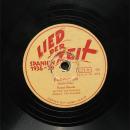
19. Песня Аб'яднаванага Фронта - Belarusian translation by Ruseslava Kyjevskaą (L. Trans.)
Песня Аб'яднаванага Фронта [1]
(Continues)
(Continues)
Contributed by Riccardo Venturi 2025/11/22 - 16:44
If I Must Die

109. Belarusian translation / Traduzione bielorussa:
Consortium News
Consortium News
Калі я павінен памерці (Continues)
Contributed by Riccardo Venturi 2025/4/6 - 19:41
Bella Ciao
Anonymous

BIELORUSSO / BELARUSIAN 2
Трымайся, браце! (Versione bielorussa degli Dzieciuki [2016])
Трымайся, браце! (Belarusian version by Dzieciuki [2016])
Трымайся, браце! (Versione bielorussa degli Dzieciuki [2016])
Трымайся, браце! (Belarusian version by Dzieciuki [2016])
Трымайся, маці! Ня плач, кахана! [1] [2]
(Continues)
(Continues)
Contributed by L'Anonimo Toscano del XXI Secolo 2024/11/22 - 20:25
По долинам и по взгорьям

Па далінах і па ўзгорках
Versione bielorussa / Belarusian version / Version biélorusse / Valkovenäjänkielinen versio
Versione bielorussa / Belarusian version / Version biélorusse / Valkovenäjänkielinen versio
Па далінах і па ўзгорках
(Continues)
(Continues)
Contributed by Riccardo Venturi 2022/5/30 - 19:33
Warszawianka 1905 roku [Варшавянка; La Varsovienne; ¡A las barricadas!]
![Warszawianka 1905 roku [Варшавянка; La Varsovienne; ¡A las barricadas!]](img/thumb/c6506_130x140.jpeg?1328189496)
1κ. La versione in lingua bielorussa
1κ. Belarusian (Byelorussian) version
1κ. Belarusian (Byelorussian) version
Like the Ukrainian version, this (anonymous?) Belarusian version appears to be a fairly faithful translation of the classical Russian version by Gleb Maksimilianovič Kržižanovskij. This classical version must have been the basis for almost all versions in the languages of former USSR. [RV]
Варшавянка
(Continues)
(Continues)
Contributed by Boreč 2021/9/10 - 09:08
L'Internationale

BIELORUSSO / BELARUSIAN 2
Versione alternativa di Janka Kupala [?]
Alternative version by Janka Kupala [?]
Questa versione bielorussa è anch'essa attribuita a Janka Kupala (1921?), ma appare diversa da quella qui presentata come standard. Sembra piuttosto una traduzione completa dell'originale francese, ma con influenze della versione russa di Aron Kots. Contribuita da Arisztid, viene qui presentata con due video e fornita di una trascrizione in Łacinka, l'alfabeto latino bielorusso.
The following Belarusian version is also credited to Yanka Kupala, but shows differences from the version labeled here as standard. It appears as a complete translation from the French original, but also showing influence from Aron Kots' Russian version. The version has been contributed by Arisztid and is provided with a couple of videos and a Łacinka transcription. [RV]
Versione alternativa di Janka Kupala [?]
Alternative version by Janka Kupala [?]
Questa versione bielorussa è anch'essa attribuita a Janka Kupala (1921?), ma appare diversa da quella qui presentata come standard. Sembra piuttosto una traduzione completa dell'originale francese, ma con influenze della versione russa di Aron Kots. Contribuita da Arisztid, viene qui presentata con due video e fornita di una trascrizione in Łacinka, l'alfabeto latino bielorusso.
The following Belarusian version is also credited to Yanka Kupala, but shows differences from the version labeled here as standard. It appears as a complete translation from the French original, but also showing influence from Aron Kots' Russian version. The version has been contributed by Arisztid and is provided with a couple of videos and a Łacinka transcription. [RV]
Інтэрнацыянал [1]
(Continues)
(Continues)
Contributed by Arisztid 2021/6/30 - 18:18
Родны Край
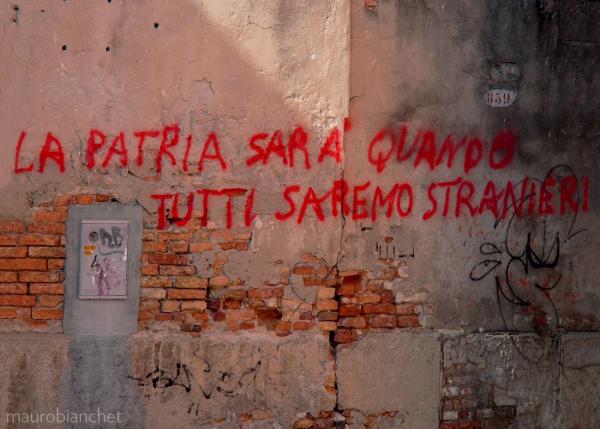
Rodny Kraj
[ 2015 ]
Словы і музыка / Testo e musica / Lyrics and music / Paroles et musique / Sanat ja sävel :
Brutto
Альбом / Album:
Родны Край [Rodni Kraj]
* Poesia di Francesco Nappo su un muro a Venezia
Band bielorusse
Sjarhej Uladsimiravić Michalok [Сяргей Уладзіміравіч Міхалок] è un musicista bielorusso-ucraino che fondò la celebre band punk Lyapis Trubetskoy nel 1990 a Minsk. Nel 2014 questa si divise dando luogo alla band Brutto e Trubetskoy Minsk il cui frontman è Pavel Bulatnikaw. Sjarhej Michalok dal 2015 risiede in Ucraina. Il nome della band è l’acronimo di Бригада Революционного Угара и Творческого Отпора имени Орнеллы Мути / Brigata di frenesia rivoluzionaria e resistenza creativa Ornella Muti [sic].
La band Brutto è molto popolare in Bielorussia e in Ucraina. Gli ucraini di Kiev hanno molto apprezzato la loro canzone Гаррі [Harry] dedicata agli ucraini... (Continues)
[ 2015 ]
Словы і музыка / Testo e musica / Lyrics and music / Paroles et musique / Sanat ja sävel :
Brutto
Альбом / Album:
Родны Край [Rodni Kraj]
* Poesia di Francesco Nappo su un muro a Venezia
Band bielorusse
Sjarhej Uladsimiravić Michalok [Сяргей Уладзіміравіч Міхалок] è un musicista bielorusso-ucraino che fondò la celebre band punk Lyapis Trubetskoy nel 1990 a Minsk. Nel 2014 questa si divise dando luogo alla band Brutto e Trubetskoy Minsk il cui frontman è Pavel Bulatnikaw. Sjarhej Michalok dal 2015 risiede in Ucraina. Il nome della band è l’acronimo di Бригада Революционного Угара и Творческого Отпора имени Орнеллы Мути / Brigata di frenesia rivoluzionaria e resistenza creativa Ornella Muti [sic].
La band Brutto è molto popolare in Bielorussia e in Ucraina. Gli ucraini di Kiev hanno molto apprezzato la loro canzone Гаррі [Harry] dedicata agli ucraini... (Continues)
Родны, родны, родны край
(Continues)
(Continues)
Contributed by Riccardo Gullotta 2021/3/22 - 23:51
Bella Ciao
Anonymous

BIELORUSSO / BELARUSIAN 1
Bella ciao (Traduzione bielorussa: Demetrius Krupenko (L. Trans.)
Bella ciao (Belarusian translation: Demetrius Krupenko (L. Trans.)
Bella ciao (Traduzione bielorussa: Demetrius Krupenko (L. Trans.)
Bella ciao (Belarusian translation: Demetrius Krupenko (L. Trans.)
Раніцай рана калі прачнуўся [1]
(Continues)
(Continues)
Contributed by Riccardo Venturi in isolamento 2020/11/12 - 11:07
Іржавая дзяржава
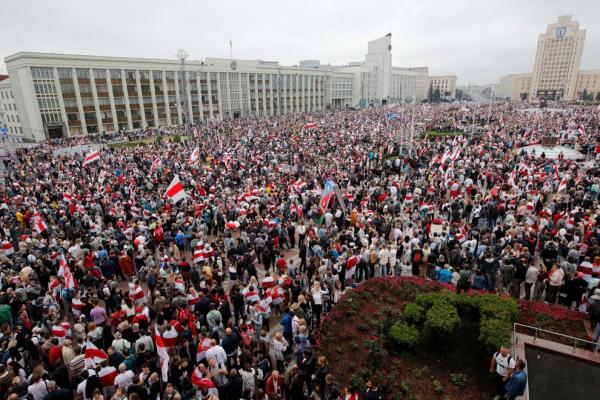
Iržavaja dzjaržava
[ 2020 ]
Словы і музыка / Testo e musica / Lyrics and music / Paroles et musique / Sanat ja sävel :
Лявон Вольскі [Lavon Volski]
Il titolo della canzone in bielorusso significa Stato arruginito. E’ una canzone recente, tra le più diffuse in questi mesi di proteste a Minsk. La sua traduzione non è disponibile in rete.
Il regime del presidente Lukashenko è accusato di autoritarismo e di scarso rispetto dei diritti umani. Gli oppositori si sono coalizzati nel Беларуская дэмакратычная апазіцыя [ Bielaruskaja demakratyčnaja apazicyja ] / Movimento per la democrazia bielorussa, di cui fa parte anche l’autore Lavon Volski , un veterano della protesta sin dagli anni ’80.
In Bielorussia le repressioni e le contraddizioni non mancano. Tra i “mezzi di produzione” e i “rapporti di produzione” si è aperta una faglia. Un’altra faglia passa tra i paesi dell’ex Unione Sovietica... (Continues)
[ 2020 ]
Словы і музыка / Testo e musica / Lyrics and music / Paroles et musique / Sanat ja sävel :
Лявон Вольскі [Lavon Volski]
Il titolo della canzone in bielorusso significa Stato arruginito. E’ una canzone recente, tra le più diffuse in questi mesi di proteste a Minsk. La sua traduzione non è disponibile in rete.
Il regime del presidente Lukashenko è accusato di autoritarismo e di scarso rispetto dei diritti umani. Gli oppositori si sono coalizzati nel Беларуская дэмакратычная апазіцыя [ Bielaruskaja demakratyčnaja apazicyja ] / Movimento per la democrazia bielorussa, di cui fa parte anche l’autore Lavon Volski , un veterano della protesta sin dagli anni ’80.
In Bielorussia le repressioni e le contraddizioni non mancano. Tra i “mezzi di produzione” e i “rapporti di produzione” si è aperta una faglia. Un’altra faglia passa tra i paesi dell’ex Unione Sovietica... (Continues)
Іржавая дзяржава [1]
(Continues)
(Continues)
Contributed by Riccardo Gullotta 2020/9/22 - 11:17
L'estaca

BIELORUSSO [ Sokalau Vojus, 2020]
BELARUSIAN [ Sokalau Vojus, 2020]
A differenza della versione bielorussa più nota, che in realtà è una versione di Mury di Jacek Kaczmarski, la seguente è una autentica traduzione bielorussa dell'originale catalano di Lluís Llach. Da questa pagina. La versione è pienamente cantabile.
Differently from the better known Belarusian version, that is in effect a version of Jacek Kaczmarski's Polish version Mury, the following is a true Belarusian traslation of Lluís Llach's original Catalan song. From this page. The version is fully singable.
"У 1968 г. бард каталёнскага нацыянальнага і антыфранкісцкага руху Люіс Ляк напісаў песьню „Слуп“ (l'Estaca). На яе стварэньне барда натхнілі развагі старога цырульніка, незалежніка-вэтэрана Нарцыса Лянсы, які зьявіўся ў творы пад мяном дзеда Сызэта. Неўзабаве песьня „Слуп“ перарасла ў змагарскі гімн каталёнскіх незалежнікаў... (Continues)
BELARUSIAN [ Sokalau Vojus, 2020]
A differenza della versione bielorussa più nota, che in realtà è una versione di Mury di Jacek Kaczmarski, la seguente è una autentica traduzione bielorussa dell'originale catalano di Lluís Llach. Da questa pagina. La versione è pienamente cantabile.
Differently from the better known Belarusian version, that is in effect a version of Jacek Kaczmarski's Polish version Mury, the following is a true Belarusian traslation of Lluís Llach's original Catalan song. From this page. The version is fully singable.
"У 1968 г. бард каталёнскага нацыянальнага і антыфранкісцкага руху Люіс Ляк напісаў песьню „Слуп“ (l'Estaca). На яе стварэньне барда натхнілі развагі старога цырульніка, незалежніка-вэтэрана Нарцыса Лянсы, які зьявіўся ў творы пад мяном дзеда Сызэта. Неўзабаве песьня „Слуп“ перарасла ў змагарскі гімн каталёнскіх незалежнікаў... (Continues)
СЛУП [1]
(Continues)
(Continues)
Contributed by Riccardo Venturi 2020/8/25 - 18:23
זאָג ניט קײנמאָל
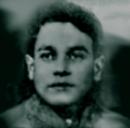
Byelorussian [Belarusian] version by Aljaksej Žbanaŭ
Il testo della versione è ripreso dal sito di Eli Rabinowitz (Sezione "Words"), ma lo abbiamo qui fornito di una trascrizione in base ai criteri utilizzati nel nostro sito. Il nome del traduttore è indicato in questa pagina.
The translated lyrics are reproduced from Eli Rabinowitz's website (Section: Words), but we have provided here a transcription according to the principles used in our site. The translator's name is stated in this page.
The translated lyrics are reproduced from Eli Rabinowitz's website (Section: Words), but we have provided here a transcription according to the principles used in our site. The translator's name is stated in this page.
Ты не кажы, што гэта дзень апошні твой. [1]
(Continues)
(Continues)
Contributed by Riccardo Venturi 2017/9/1 - 20:39
Where Have all the Flowers Gone

BIELORUSSO / BELARUSIAN / BIÉLORUSSE
Bar Akaryna
Бар Акарына
"Выступ фіналістаў конкурсу "Засьпявай 3.0" у намінацыі "Замежны пераклад", 8.07, 2016, дворык на Свабоды, 4"
Bar Akaryna
Бар Акарына
"Выступ фіналістаў конкурсу "Засьпявай 3.0" у намінацыі "Замежны пераклад", 8.07, 2016, дворык на Свабоды, 4"
АДКАЖЫ, ДЗЕ КВЕТКІ ЎСЕ?
(Continues)
(Continues)
Contributed by Elter András 2017/7/26 - 12:26
Братские могилы

Byelorussian translation by Rascisłaŭ Benzjaruk (2000), from this page
Расціслаў Бензярук. Пераклад, 2000
Расціслаў Бензярук. Пераклад, 2000
La traduzione è seguita da una trascrizione in caratteri latini (in alfabeto łacinka)
The translation is provided with a transcription into Latin characters (łacinka alphabet).
The translation is provided with a transcription into Latin characters (łacinka alphabet).
БРАЦКІЯ МАГІЛЫ
(Continues)
(Continues)
Contributed by Riccardo Venturi 2015/4/7 - 05:40
Небасхіл Еўропы

Testo in bielorusso di Глеб Лабадзенка [Hleb Labadzenka]
Musica di Александр Рыбак [Aleksandr Rybak]
Musica di Александр Рыбак [Aleksandr Rybak]
Супакой мяне на небе душы
(Continues)
(Continues)
Contributed by Krzysiek Wrona 2015/3/1 - 00:09
Hej sokoły

Гэй, над рэчкай, над чарненькай
(Continues)
(Continues)
Contributed by Krzysiek Wrona 2013/12/4 - 23:01
Mury

Andräj Valeŕievič Chadanovič (Андрэй Валер'евіч Хадановіч) [2010]
Performed by Źmicier Vajciuśkievič
La versione bielorussa di Mury (che si intitola Mury: una prova in più della vicinanza tra il polacco e il bielorusso...) è, tra le tante della canzone di Jacek Kaczmarski basata su L'estaca, forse la più famosa, cantata e utilizzata durante le rivolte contro il dittatore Lukašenko (o Lukašenka, alla bielorussa), ferreo alleato di Vladimir Putin. La versione del poeta Andräj Valeŕievič Chadanovič è del 2010 e fu immediatamente usata nelle manifestazioni di quell'anno contro la dittatura di Lukašenko; ma non ha mai cessato di essere il simbolo dell'opposizione all'autocrate bielorusso, specialmente durante la repressione in seguito alle fraudolente elezioni presidenziali del 2020. [RV]
Performed by Źmicier Vajciuśkievič
La versione bielorussa di Mury (che si intitola Mury: una prova in più della vicinanza tra il polacco e il bielorusso...) è, tra le tante della canzone di Jacek Kaczmarski basata su L'estaca, forse la più famosa, cantata e utilizzata durante le rivolte contro il dittatore Lukašenko (o Lukašenka, alla bielorussa), ferreo alleato di Vladimir Putin. La versione del poeta Andräj Valeŕievič Chadanovič è del 2010 e fu immediatamente usata nelle manifestazioni di quell'anno contro la dittatura di Lukašenko; ma non ha mai cessato di essere il simbolo dell'opposizione all'autocrate bielorusso, specialmente durante la repressione in seguito alle fraudolente elezioni presidenziali del 2020. [RV]
МУРЫ [1]
(Continues)
(Continues)
Contributed by Jauhien Piatlicki 2013/11/30 - 15:25
Auferstanden aus Ruinen

Даслоўны (нелітаратурны) пераклад
АДРОДЖАНАЯ З РУІНАЎ
(Continues)
(Continues)
Contributed by Riccardo Venturi 2012/12/4 - 22:13
Банька по-белому

Byelorussian version by Mixaś Bulavacki (1999)
Da/from Questa pagina/This page
Da/from Questa pagina/This page
Il testo originale è seguito da una trascrizione in caratteri latini secondo gli standard di questo sito.
Lyrics are followed by a Latin transliteration according to site standard.
Lyrics are followed by a Latin transliteration according to site standard.
ЛАЗЬНЯ ПА-БЕЛАМУ
(Continues)
(Continues)
Contributed by Riccardo Venturi 2010/10/12 - 14:42
Он не вернулся из боя

Byelorussian version by Rascislaŭ Benzjaruk (2000)
Da/from Questa pagina/This page
Da/from Questa pagina/This page
Il testo è seguito da una traslitterazione in caratteri latini secondo gli standard di questo sito.
Lyrics are followed by a Latin transliteration according to site standard.
Lyrics are followed by a Latin transliteration according to site standard.
ЁН НЕ ВЯРНУЎСЯ З БОЮ
(Continues)
(Continues)
Contributed by Riccardo Venturi 2010/10/10 - 21:07
L'Internationale
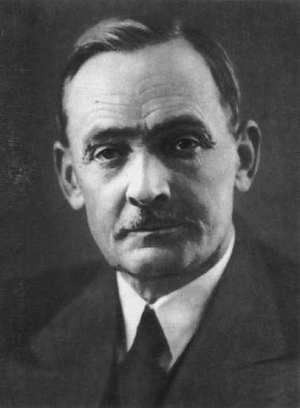
BIELORUSSO / BELARUSIAN 1
Versione bielorussa di Janka Kupala
Belarusian version by Janka Kupala
1921
La versione standard in lingua bielorussa di Janka Kupala.
Yanka Kupala's standard Belarusian version.
Janka Kupala, pseudonimo di Ivan Daminikavič Lucevič (1882-1942) è stato tra i più grandi scrittori e poeti in lingua bielorussa. Inizialmente entusiasta per la Rivoluzione d'Ottobre, tradusse l'Internazionale in bielorusso nel 1921.
Yanka Kupala, pen-name of Ivan Daminikavič Lucevič (1882-1942), was a Belarusian poet and writer. Kupala is considered one of the greatest Belarusian-language writers of the 20th century.
"Пераклад міжнароднага пралетарскага гімна “Інтэрнацыянал” зроблены Я. Купалам на патрэбу дня, на патрэбу першым рэвалюцыйным гадам. Ствараўся ён адначасова з вершаваным перакладам “Слова аб палку Ігаравым” і ўпершыню быў апублікаваны ў газеце “Савецкая Беларусь” (1921,... (Continues)
Versione bielorussa di Janka Kupala
Belarusian version by Janka Kupala
1921
La versione standard in lingua bielorussa di Janka Kupala.
Yanka Kupala's standard Belarusian version.
Janka Kupala, pseudonimo di Ivan Daminikavič Lucevič (1882-1942) è stato tra i più grandi scrittori e poeti in lingua bielorussa. Inizialmente entusiasta per la Rivoluzione d'Ottobre, tradusse l'Internazionale in bielorusso nel 1921.
Yanka Kupala, pen-name of Ivan Daminikavič Lucevič (1882-1942), was a Belarusian poet and writer. Kupala is considered one of the greatest Belarusian-language writers of the 20th century.
"Пераклад міжнароднага пралетарскага гімна “Інтэрнацыянал” зроблены Я. Купалам на патрэбу дня, на патрэбу першым рэвалюцыйным гадам. Ствараўся ён адначасова з вершаваным перакладам “Слова аб палку Ігаравым” і ўпершыню быў апублікаваны ў газеце “Савецкая Беларусь” (1921,... (Continues)
Інтэрнацыянал [1]
(Continues)
(Continues)
Contributed by Riccardo Venturi 2005/6/15 - 00:05
×
![]()



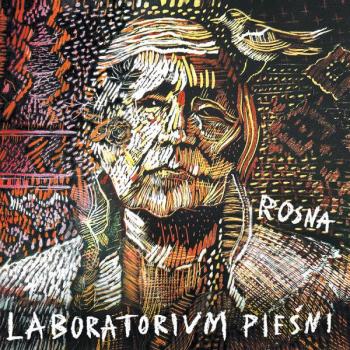

Belarusian translation from lyricstranslate